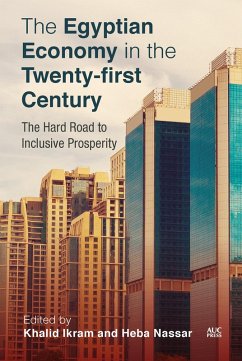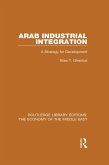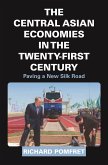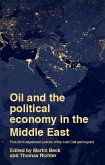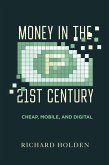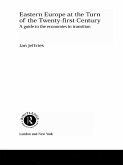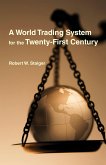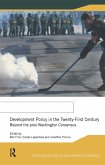A multi-faceted account of Egyptian economic development by nineteen internationally recognized authorities and the critical challenges the economy is likely to face in the next twenty years
The Egyptian Economy in the Twenty-first Century addresses the question of why Egypt, despite possessing a plethora of assets-such as a fertile agriculture, a strategic geographic location, oil and gas deposits, innumerable tourist sites, a labor force prized by regional countries, and a diaspora that remits large amounts of funds-has seldom performed to its economic potential during the last sixty years. Indeed, economic weakness created political weakness, and often exposed the country to foreign diktats. What should the country do to change this state of affairs?
Nineteen internationally recognized authorities on the Egyptian economy discuss the critical challenges that the Egyptian economy is likely to face in the next two to three decades, challenges which must be overcome in order to improve the life of Egypt's citizens and to protect the country from external pressures. Their analyses cover population and employment; development strategies; principal macroeconomic issues; development of a digital economy; fiscal and monetary matters; the external sector; poverty and income distribution; the enterprise structure; higher education; water availability; urbanization; institutional performance; and many others.
Contributors:
- Gouda Abdel Khalek, Cairo University, Cairo, Egypt
- Khaled M. Abu-Zeid, Regional Water Resources, CEDARE (Center for Environment and Development for the Arab Region and Europe), Cairo, Egypt.
- Fatma El Ashmawy, World Bank.
- Ragui Assaad, University of Minnesota, Twin Cities of Minneapolis and Saint Paul, Minnesota, USA
- Izak Atiyas, Economic Research Forum, Cairo, Egypt.
- Marwa Biltagy, Cairo University, Cairo, Egypt.
- Lahcen Bounader, International Monetary Fund.
- Ishac Diwan, École Normale Supérieure, Paris, France.
- Ahmed Ghoneim, Cairo University, Cairo, Egypt.
- Khalid Ikram, Washington DC, USA.
- Karima Korayem, al-Azhar University, Cairo, Egypt.
- Heba el-Laithy, Cairo University, Cairo, Egypt.
- Noha el-Mikawy, Ford Foundation, Middle East and North Africa, Cairo, Egypt.
- Mohamed Mohieddin, Menoufia University, Menoufia, Egypt.
- Heba Nassar, Cairo University, Cairo, Egypt.
- Osman Mohamed Osman, Cairo, Egypt.
- Noha Razek, University of Regina, Regina, Saskatchewan, Canada.
- David Sims, Cairo, Egypt.
- John Waterbury, Princeton, New Jersey.
The Egyptian Economy in the Twenty-first Century addresses the question of why Egypt, despite possessing a plethora of assets-such as a fertile agriculture, a strategic geographic location, oil and gas deposits, innumerable tourist sites, a labor force prized by regional countries, and a diaspora that remits large amounts of funds-has seldom performed to its economic potential during the last sixty years. Indeed, economic weakness created political weakness, and often exposed the country to foreign diktats. What should the country do to change this state of affairs?
Nineteen internationally recognized authorities on the Egyptian economy discuss the critical challenges that the Egyptian economy is likely to face in the next two to three decades, challenges which must be overcome in order to improve the life of Egypt's citizens and to protect the country from external pressures. Their analyses cover population and employment; development strategies; principal macroeconomic issues; development of a digital economy; fiscal and monetary matters; the external sector; poverty and income distribution; the enterprise structure; higher education; water availability; urbanization; institutional performance; and many others.
Contributors:
- Gouda Abdel Khalek, Cairo University, Cairo, Egypt
- Khaled M. Abu-Zeid, Regional Water Resources, CEDARE (Center for Environment and Development for the Arab Region and Europe), Cairo, Egypt.
- Fatma El Ashmawy, World Bank.
- Ragui Assaad, University of Minnesota, Twin Cities of Minneapolis and Saint Paul, Minnesota, USA
- Izak Atiyas, Economic Research Forum, Cairo, Egypt.
- Marwa Biltagy, Cairo University, Cairo, Egypt.
- Lahcen Bounader, International Monetary Fund.
- Ishac Diwan, École Normale Supérieure, Paris, France.
- Ahmed Ghoneim, Cairo University, Cairo, Egypt.
- Khalid Ikram, Washington DC, USA.
- Karima Korayem, al-Azhar University, Cairo, Egypt.
- Heba el-Laithy, Cairo University, Cairo, Egypt.
- Noha el-Mikawy, Ford Foundation, Middle East and North Africa, Cairo, Egypt.
- Mohamed Mohieddin, Menoufia University, Menoufia, Egypt.
- Heba Nassar, Cairo University, Cairo, Egypt.
- Osman Mohamed Osman, Cairo, Egypt.
- Noha Razek, University of Regina, Regina, Saskatchewan, Canada.
- David Sims, Cairo, Egypt.
- John Waterbury, Princeton, New Jersey.
Dieser Download kann aus rechtlichen Gründen nur mit Rechnungsadresse in A, D ausgeliefert werden.

